

Choice and Truth: Libya: Ten Things About Gaddafi They Don’t Want You To Know. Vital Signs: President Trump would cause financial Armageddon. Vital Signs is a weekly economic wrap from UNSW economics professor and Harvard PhD Richard Holden (@profholden).

Vital Signs aims to contextualise weekly economic events and cut through the noise of the data impacting global economies. This week: Donald Trump’s criticism of the US Federal Reserve has economists worried. I wrote in this column last week that if Donald J. Trump is elected President of the United States there is a real chance of “financial Armageddon”. Plato's Problem. Noam Chomsky. Avram Noam Chomsky (/ˈnoʊm ˈtʃɒmski/; born December 7, 1928) is an American linguist, philosopher,[21][22] cognitive scientist, logician,[23][24][25] political commentator and anarcho-syndicalist activist.
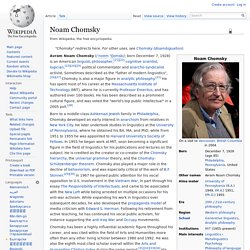
Sometimes described as the "father of modern linguistics",[26][27] Chomsky is also a major figure in analytic philosophy.[21] He has spent most of his career at the Massachusetts Institute of Technology (MIT), where he is currently Professor Emeritus, and has authored over 100 books. He has been described as a prominent cultural figure, and was voted the "world's top public intellectual" in a 2005 poll.[28] Born to a middle-class Ashkenazi Jewish family in Philadelphia, Chomsky developed an early interest in anarchism from relatives in New York City.
Theconversation. In 2015, more than 280,000 votes were received in the New South Wales election from a personal computer or mobile phone.
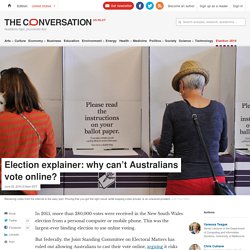
This was the largest-ever binding election to use online voting. But federally, the Joint Standing Committee on Electoral Matters has ruled out allowing Australians to cast their vote online, arguing it risks “catastrophically compromising our electoral integrity”. Despite years of research, nobody knows how to provide evidence of an accurate result while keeping individual online votes private. Internet voting is similar to online banking, except you’re not sent a receipt saying “this is how you voted” because then you could be coerced or bribed. Treatise on the Problem of Evil. Thank you for your interest in Patheos newsletters!

Please enter your email address below and click the "Subscribe" button. Thank you for your subscription. You can visit your Preference Center to complete your profile and see what else we have to offer. We apologize, we were unable to complete your subscription at this time, please try again later. If this error persists please contact us at communications@patheos.com. Sharpening Contradictions: Why al-Qaeda attacked Satirists in Paris. By Juan Cole | (Informed Comment) The horrific murder of the editor, cartoonists and other staff of the irreverent satirical weekly Charlie Hebdo, along with two policemen, by terrorists in Paris was in my view a strategic strike, aiming at polarizing the French and European public.
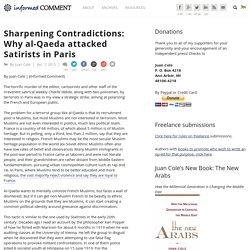
The problem for a terrorist group like al-Qaeda is that its recruitment pool is Muslims, but most Muslims are not interested in terrorism. Most Muslims are not even interested in politics, much less political Islam. France is a country of 66 million, of which about 5 million is of Muslim heritage. But in polling, only a third, less than 2 million, say that they are interested in religion. Al-Qaeda wants to mentally colonize French Muslims, but faces a wall of disinterest. This tactic is similar to the one used by Stalinists in the early 20th century.
Anarcho-syndicalism. Anarcho-syndicalism (also referred to as revolutionary syndicalism[1]) is a theory of anarchism which views revolutionary industrial unionism or syndicalism as a method for workers in capitalist society to gain control of an economy and, with that control, influence broader society.
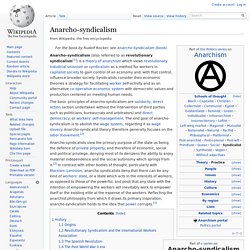
Syndicalists consider their economic theories a strategy for facilitating worker self-activity and as an alternative co-operative economic system with democratic values and production centered on meeting human needs. The basic principles of anarcho-syndicalism are solidarity, direct action (action undertaken without the intervention of third parties such as politicians, bureaucrats and arbitrators) and direct democracy, or workers' self-management. The end goal of anarcho-syndicalism is to abolish the wage system, regarding it as wage slavery.
Anarcho-syndicalist theory therefore generally focuses on the labor movement.[2] History Origins Revolutionary Syndicalism and the International Workers Association Film. Libertarian socialism. Overview[edit]
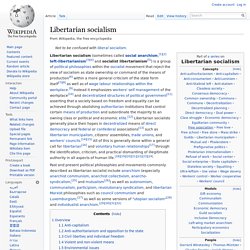
William Everard. Left mythology and neoliberal globalization: Syriza and Podemos, Takis Fotopoulos, The International Journal of INCLUSIVE DEMOCRACY, Vol. 11, Nos. 1/2 (Winter-Summer 2015) Therefore, the rise to power of these parties far from being, (as Tsipras, the leader of the Greek Syriza party stressed to the delight of the world liberal “Left”), “a ‘historic opportunity’ for a left alternative to the current capitalist ‘European model’,”[4] in my opinion, will simply lead to the end of the Left in Southern Europe.
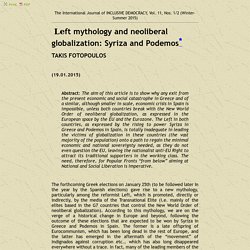
On this, the Mediterranean Left will simply follow belatedly the fate of the Left in the “North” (Northern Europe, North America etc.) which is already dead and buried, mainly as a result of the fact that it has been integrated into the NWO of neoliberal globalization, at least since the late ‘90s. The International Journal of Inclusive Democracy. The International Journal of Inclusive Democracy pdf.
Inclusive Democracy. Georgism. Georgist ideas were popular and influential in the earlier part of the 20th century.[13] Political parties, institutions and communities were founded based on Georgist principles during that time.
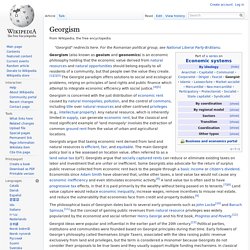
Early followers of George's philosophy called themselves Single Taxers, associated with the idea raising public revenue exclusively from land and privileges, but the term is considered a misnomer because Georgists do not consider their proposals to be true taxes and they usually support multiple funding mechanisms. In classical and Georgist economics, the term 'land' is defined as all locations, natural opportunities, resources, physical forces, and government privileges over economic domains, which is closely related to the concept of commons.[14] Georgism was coined later, and some prefer the term geoism or geonomics to distinguish their beliefs from those of Henry George.[15] instead.[16] Main tenets[edit]
Surplus economics. Surplus economics is the study of economics based upon the concept that economies operate on the basis of the production of a surplus over basic needs.
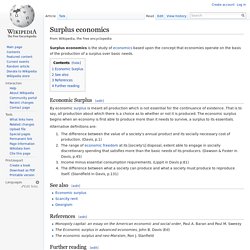
Economic Surplus[edit] Participatory economics. Albert and Hahnel stress that parecon is only meant to address an alternative economic theory and must be accompanied by equally important alternative visions in the fields of politics, culture and kinship. The authors have also discussed elements of anarchism in the field of politics, polyculturalism in the field of culture, and feminism in the field of family and gender relations as being possible foundations for future alternative visions in these other spheres of society. Stephen R. Shalom has begun work on a participatory political vision he calls "par polity". Both systems together make up the political philosophy of Participism. Participatory Economics has also significantly shaped the interim International Organization for a Participatory Society.
Decision-making principle[edit] Workers' self-management. Self-management or workers' self-management (also referred to as labor management, autogestión, workers' control, industrial democracy and producer cooperatives) is a form of management that involves management of an organization by its workers. 2015 Intergenerational Report.
Every five years, the Australian Government produces an Intergenerational Report that assesses the long-term sustainability of current Government policies and how changes to Australia’s population size and age profile may impact on economic growth, workforce and public finances over the next 40 years. The Government is required to produce an Intergenerational Report at least every five years. The first three Intergenerational Reports were produced in 2002, 2007 and 2010. The Intergenerational Report contains analysis of the key drivers of economic growth – population, participation and productivity – and examines what projected changes in these areas mean for our standard of living and public policy settings.
National Press Club: Belinda Robinson - National Press Club. National Press Club.